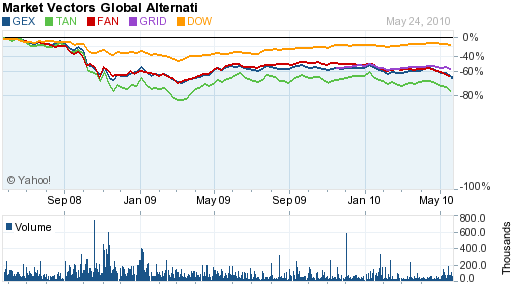Alternative ETFs Always Know What You’re Buying
Post on: 13 Апрель, 2015 No Comment

Another investor tip: Always ask, ‘Can I store that commodity in my basement?’
How doees that ETF really track commodities?
Three exchange-traded fund industry experts recently discussed how alternative ETFs work and what investors should look out for.
Jackie Chin, Managing Director of ETF Platform Management at Charles Schwab; Kevin DiSano, Executive Vice President at IndexIQ; and Mike McGlone, Head of Research at ETF Securities were a part of Charles Schwabs most recent Every Third Friday conference call.
In this market environment with stocks at all-time highs, bonds at all-time highs with interest rates where they are, its certainly a good opportunity to look at these types of investments, DiSano said.
Alternative ETFs, which Chin describes as a type of investment thats uncorrelated to the market, provide returns that are opposite of more traditional long-equity and fixed income investments.
In short, it offers investors an opportunity to hedge risks and diversify their portfolio, she said. Adding, ETFs can democratize investing, making it easier to access alternatives.
To explain alternative ETFs, Chin broke them down into two broad categories: commodities the more basic type of alternative investment that includes things like precious metals, energy and agriculture and more sophisticated products in the alternative space, like long-short strategy, hedge fund replication and merger arbitrage.
Its important that investors know that [ETFs] are not all created equal, she said. With any ETF, investors should really understand not only the strategy but the product structure before they buy. These products tend to be more complex and they can use things like futures, leverage, so theyre not for all investors.
McGlone agreed with Chin on this, and added Always know what you buy.
Looking at Schwabs flows into these alternative ETF categories, commodities and the more sophisticated products, Chin said she did not see a lot of flows into commodities last year.
I think this is consistent to the industry where commodities were out of favor in 2015, she said.
However, there was some increased interest the more sophisticated alternative products, she said.
They represented about 4% of the total flows at Schwab last year and with that we saw these flows coming in from all our client segments the RIAs, the traders, and the retail clients, Chin said.
McGlone, too, had some advice for retail investors wanting to use commodities for long-term diversification.
I think the number one thing to remember with commodities for investors is, always remember, think to yourself when you purchase or want to purchase a commodity, Can I store that commodity in my basement? McGlone said. And generally you cant you cant store live hogs or cattle or crude oil [in your basement]. So because you cant do that, theres always going to be a cost related to that storage cost, and that will be related in the investment, and thats generally reflected in the futures curve, and thats how you get exposure.
Historically, he added, that commodities that are easier to store will have more backwardation and generally are better.
This is why McGlone also says that investors always need to know what kind of product they buy and how they buy it.
Any time you buy any type of ETF that tracks commodities, you really need to know how it does that, he said.














